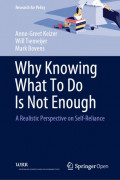
Why knowing what to do is not enough :a realistic perspective on self-reliance
This open access book sets out to explain the reasons for the gap between “knowing” and “doing” in view of self-reliance, which is more and more often expected of citizens. In today’s soc…
- Edisi
- -
- ISBN/ISSN
- 9789402417258
- Deskripsi Fisik
- ix, 157p. : ill.
- Judul Seri
- -
- No. Panggil
- 179.9 KEI w

Moral History from Herodotus to Diodorus Siculus
Why did human beings first begin to write history? Lisa Irene Hau argues that a driving force among Greek historians was the desire to use the past to teach lessons about the present and for the fu…
- Edisi
- -
- ISBN/ISSN
- 9781474411073
- Deskripsi Fisik
- VIII, 312 p.
- Judul Seri
- -
- No. Panggil
- 170.938 HAU m
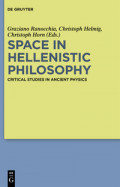
Space in Hellenistic Philosophy :Critical Studies in Ancient Physics
The volume discusses the notion of space by focusing on the most representative exponents of the Hellenistic schools and explores the role played by spatial concepts in both coeval and later author…
- Edisi
- -
- ISBN/ISSN
- 9783110365856
- Deskripsi Fisik
- XII, 224 p.
- Judul Seri
- -
- No. Panggil
- 114.0938 HEL s
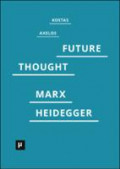
Introduction to a Future Way of Thought on Marx and Heidegger
"Technologists only change the world in various ways in generalized indifference; the point is to think the world and interpret the changes in its unfathomability, to perceive and experience the di…
- Edisi
- -
- ISBN/ISSN
- 9783957960054
- Deskripsi Fisik
- 183p.
- Judul Seri
- -
- No. Panggil
- 193 INT i
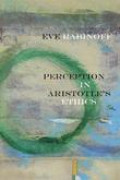
Perception in Aristotle’s Ethics
Rabinoff strives to account for ethical perception (aisthesis) in Aristotle’s ethics—to give it a place of importance in ethical choice and action—and to offer an account of the faculty of pe…
- Edisi
- -
- ISBN/ISSN
- 9780810136434
- Deskripsi Fisik
- IX, 196 p.
- Judul Seri
- -
- No. Panggil
- 171.3 RAB p
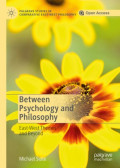
Between psychology and philosophy :east-west themes and beyond
This open access book discusses a variety of important but unprecedented ways in which psychology can be useful to philosophy. The early chapters illustrate this theme via comparisons between Chine…
- Edisi
- -
- ISBN/ISSN
- 9783030225032
- Deskripsi Fisik
- x, 215p. : ill.
- Judul Seri
- -
- No. Panggil
- 101 SLO b
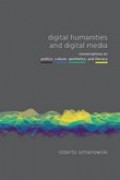
Digital humanities and digital media:conversations on politics, culture, aest…
There is no doubt that we live in exciting times: Ours is the age of many ‘silent revolutions’ triggered by startups and research labs of big IT companies; revolutions that quietly and profound…
- Edisi
- -
- ISBN/ISSN
- 9781785420306
- Deskripsi Fisik
- -
- Judul Seri
- -
- No. Panggil
- 144.2116 SIM d
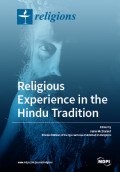
Religious experience in the Hindu tradition
This Special Issue of Religions brings together a talented group of international scholars who have studied and written on the Hindu tradition. The topic of religious experience is much debated in …
- Edisi
- -
- ISBN/ISSN
- 9783039210503
- Deskripsi Fisik
- -
- Judul Seri
- -
- No. Panggil
- 181.4 REL r
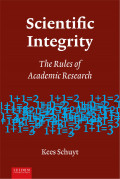
Scientific integrity :the rules of academic research
The growing attention for scientific integrity is part of a wider culture of professionalization and accountability − which appears to signal that integrity is no longer self-evident as a core va…
- Edisi
- -
- ISBN/ISSN
- 9789400602182
- Deskripsi Fisik
- 182p. : ill.
- Judul Seri
- -
- No. Panggil
- 174.95072 SCH s

Urban memory and visual culture in Berlin:framing the asynchronous city, 1957…
As sites of turbulence and transformation, cities are machines for forgetting. And yet archiving and exhibiting the presence of the past remains a key cultural, political and economic activity in m…
- Edisi
- -
- ISBN/ISSN
- 9789089648532
- Deskripsi Fisik
- 212 pages : illustrations; 24 cm.
- Judul Seri
- -
- No. Panggil
- 153 WAR u

 Karya Umum
Karya Umum  Filsafat
Filsafat  Agama
Agama  Ilmu-ilmu Sosial
Ilmu-ilmu Sosial  Bahasa
Bahasa  Ilmu-ilmu Murni
Ilmu-ilmu Murni  Ilmu-ilmu Terapan
Ilmu-ilmu Terapan  Kesenian, Hiburan, dan Olahraga
Kesenian, Hiburan, dan Olahraga  Kesusastraan
Kesusastraan  Geografi dan Sejarah
Geografi dan Sejarah